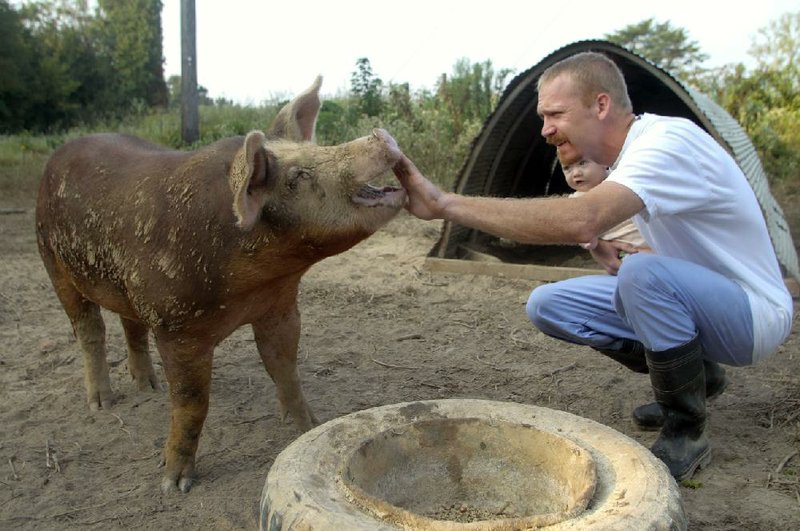Will French thinks raising hogs in pastures on his farm in Perry, where the animals can root, and wallow, and well, act like pigs, is the best way to keep his small farm profitable and producing the best product possible.
French’s 14-acre operation in Perry County was recently certified by Virginia-based Animal Welfare Approved, which audits and accredits independently owned farms that raise animals outdoors on pastures.
“It lets people know how I’m raising my animals,” French said of the Animal Welfare Approved stamp of approval. “For me, it’s about giving them as natural an environment as possible.”
He sells his products - including eight types of sausage, roasts, hams and pork chops - at the Argenta Farmers Market in North Little Rock and in cooperation with Farm Girl NaturalFoods in nearby Perryville. Farm Girl Natural Foods is also certified by Animal Welfare Approved for its cattle and hog operations.
There are eight Animal Welfare Approved farms endorsed in Arkansas. One of those certifications belongs to the Dale Bumpers Small Farms Research Center in Booneville, which was the first and only federal site to gain the certification.
Animal Welfare Approved is a third-party auditor that monitors animals raised on farms. The voluntary standards require that animals be raised outdoors on pastures or rangeland and be allowed to live as naturally as possible.
The nonprofit formed by the Animal Welfare Institute audits participating farms annually. It was founded in 2006 in response to growing consumer interest in how farm animals are raised and how food is produced, according to its website. It has certified nearly 2,000 farms in the U.S. and Canada.
Andrew Gunther, program director for Animal Welfare Approved, said farmers must apply for the certification and are visited by an inspector who makes sure the operation meets all the organization’s strict criteria. He said additional standards must be met and inspections are required from farms that have an animal slaughter component to assure the process is humane.
“We consider ourselves the eyes and ears of the conscientious consumer,” Gunther said.
Carolyn Stull, animal welfare extension specialist with the School of Veterinary Medicine at the University of California at Berkley, said programs like those operated by the Animal Welfare Institute and the American Humane Association help both farmers and consumers. She said certification from credible animal welfare programs give farmers considerable marketing advantages, making their products attractive to high-end restaurants, grocery stores and some consumers.
“Consumers want to feel good about what they’re buying,” she said.
David Fernandez, extension livestock specialist at the University of Arkansas Pine Bluff, said raising hogs is a tough business, no matter if it’s a large scale confinement operation or a small farm focused on pasture-raised animals.
C&H Hog Farms, the first operation in Arkansas to be issued a federal large-scale concentrated animal feeding operation permit through the National Pollutant Discharge Elimination System, has drawn criticism from both environmental activists and tourism advocates since beginning production earlier this year. Much of the criticism stems from fears that waste from the approximately 6,500 animals the facility is permitted to house will contaminate both groundwater and surface water in nearby Big Creek, a major tributary to the Buffalo National River.In August, a coalition of environmental activist groups filed suit against several departments of the federal government, including the U.S. Department of Agriculture, the Farm Service Agency and the Small Business Administration, arguing they failed to properly assess the environmental impact of the farm, which is located in Newton County, before issuing loan guarantees for the project.
According to data from the Arkansas Field Office of the United States Department of Agriculture National Agricultural Statistics Service, small hog farms make up a tiny fraction of the state’s total hog production. According to the 2007 Farm Census, Arkansas had a hog inventory of 289,000 animals, of which fewer than 9,000 were on farms that housed under 100 animals.
Today, Arkansas’ total hog inventory is much smaller. According to 2012 data, the state had an inventory of 110,000 animals. There were 66.35 million in the entire U.S.
According to a report on pork production by the Environmental Protection Agency, before the 1960s most hogs in the U.S. were raised in outside lots or on pasture systems. The development of slotted floors and other equipment allowed hog production to move indoors and into much tighter spaces, allowing for more intense production schedules on fairly small pieces of land.
Fernandez said with confinement operations profit margins are thin and expenses are high. With smaller niche operations like those focused on pasture-raised pigs, finding a market where farmers can demand a premium price for their animals is challenging and vital for success.
French, 34, and a stay-at-home dad, began his hog operation in 2008. He also has pasture-raised poultry at his farm and plans on seeking Animal Welfare Approved certification for the birds as well.
The pigs at Will French Farm live in quarter-acre sections bordered by a portable hot wire setup that shocks the pigs if they try to get out. The hogs are allowed to root, wallow and are given movable huts for shelter. Once the hogs work over an area, they’re moved along to a fresh section of land.
The sows he currently has are Hampshires, selected because they are hardy and do well outdoors.
“These aren’t your typical hog-house pigs,” French said.
French said he was drawn to pasture raising his pigs, in part, because of the lack of infrastructure required. He says it can be a labor intensive way to raise hogs, but the trade off is low capital investment and no need to worry about disposal of pigwaste. In fact, the pig waste helps the land once the pigs have moved on.
“You can tell where they’ve been. The grass is so green,” he said, adding they also clear out honeysuckle and brambles from his woods.
Business, Pages 71 on 09/15/2013

